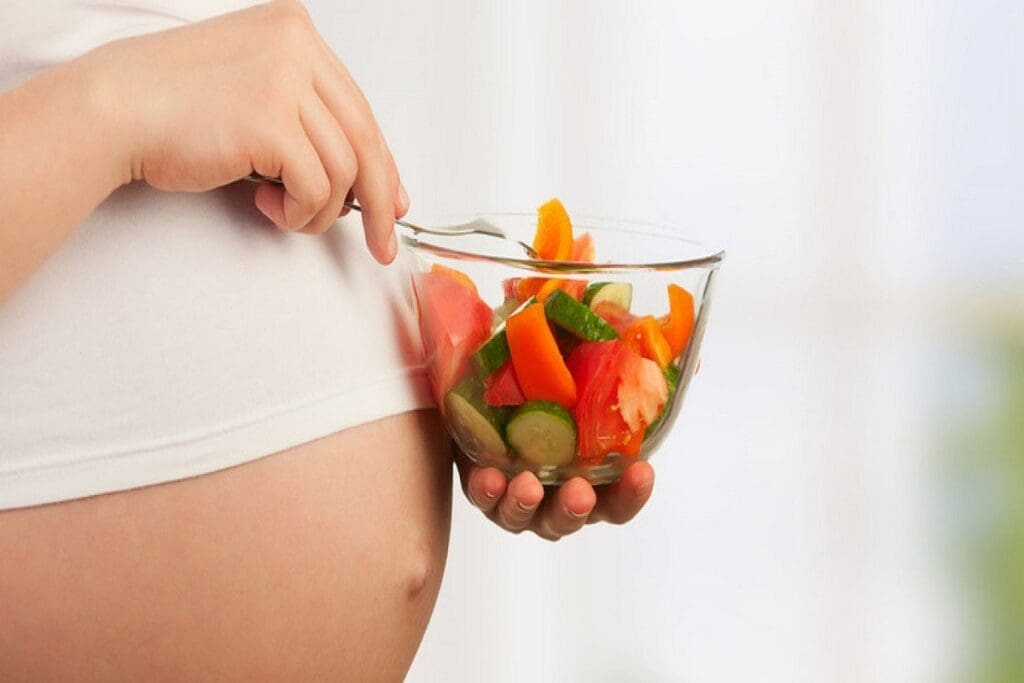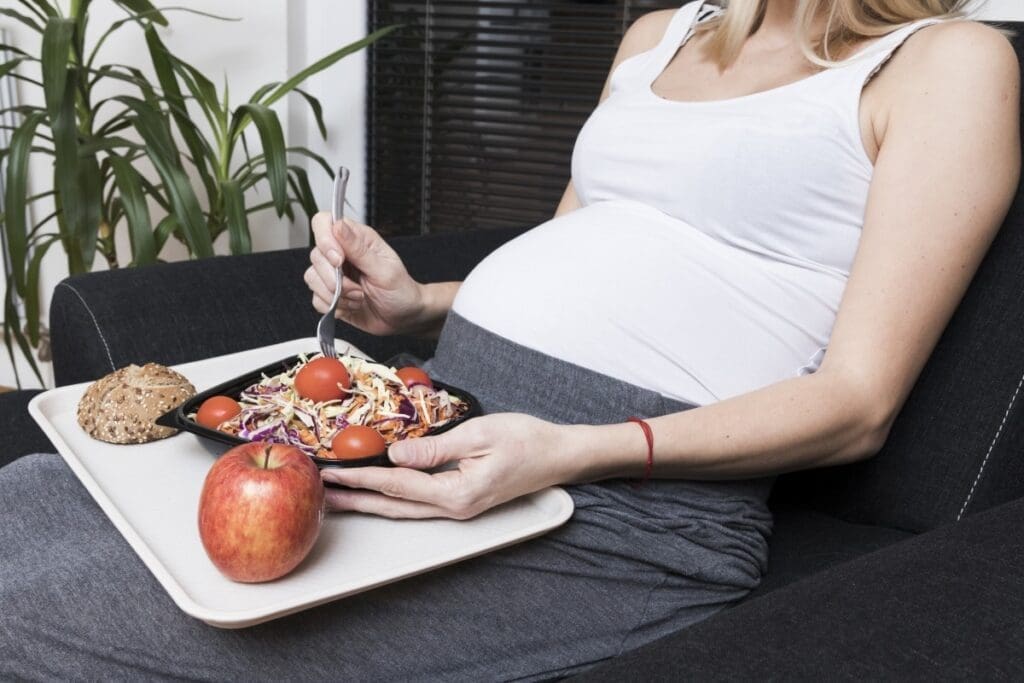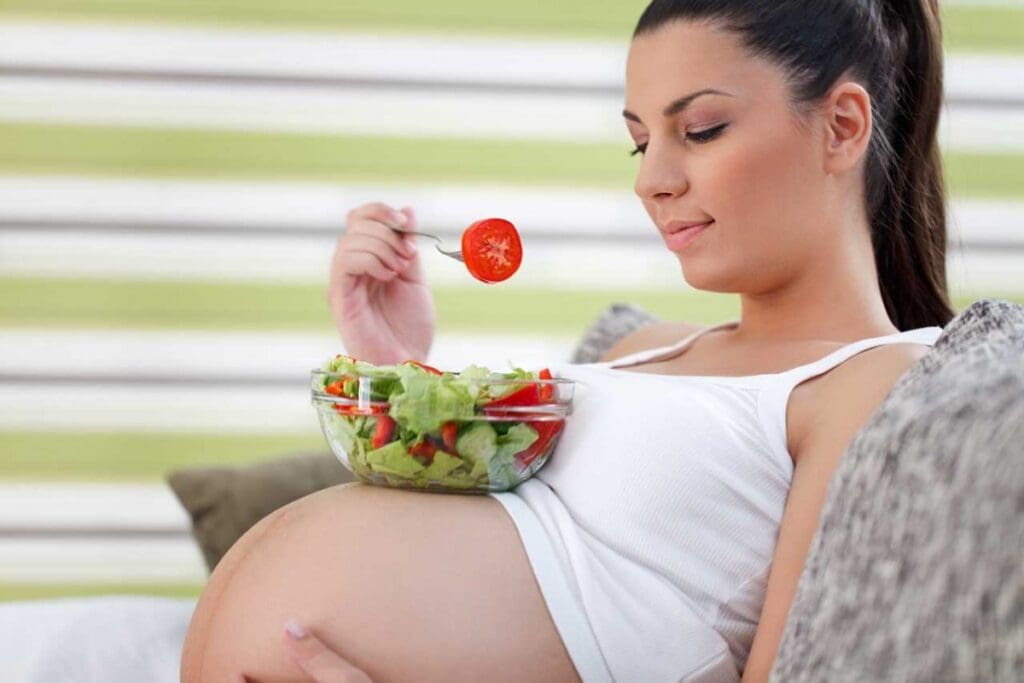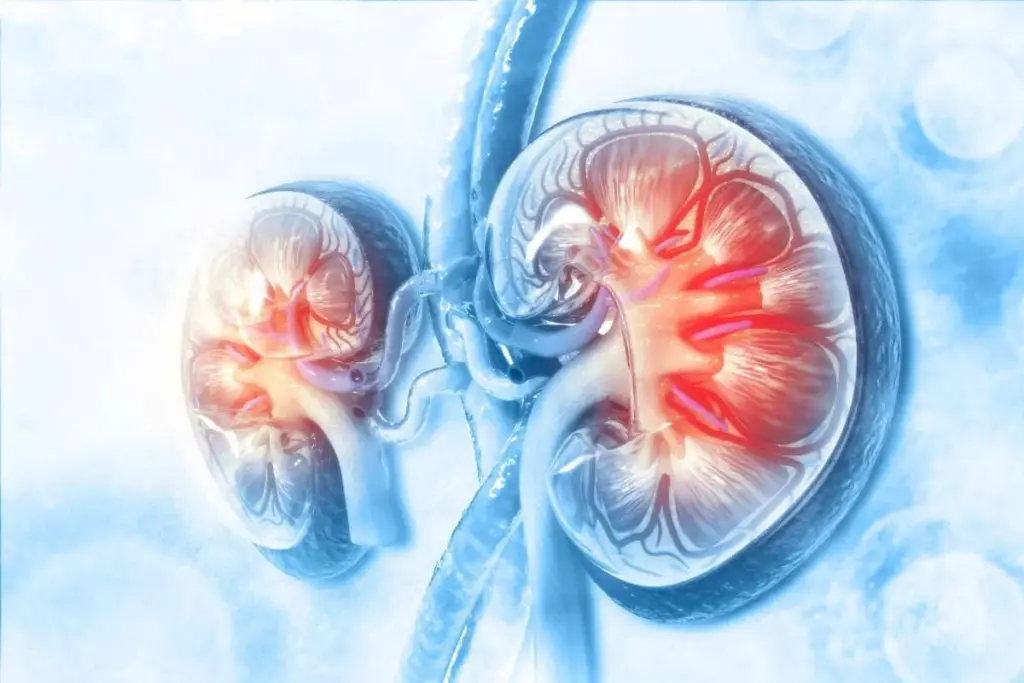Eating well before and during pregnancy is key to avoiding birth defects. Studies from Stanford University show that women with better diets face lower risks of neural tube defects (NTDs) and cleft lip/palate.
The foods we eat give us important nutrients for health. A diet full of vital vitamins and minerals is essential for preventing birth defects. By choosing the right foods, you can greatly improve your baby’s health.

Learn what to eat to avoid birth defects and discover which nutrient lowers the risk of neural tube defects for a healthy pregnancy.
Key Takeaways
- Eat a well-balanced diet before and during pregnancy to reduce birth defects.
- Include foods rich in vital vitamins and minerals in your pre-pregnancy diet.
- A higher-quality diet can lower the risk of NTDs and orofacial clefts.
- Research supports the importance of a preconception diet in preventing birth defects.
- Make informed food choices to positively impact your baby’s health.
The Critical Connection Between Nutrition and Birth Defects
Eating well before and during pregnancy can lower the chance of birth defects. Good nutrition is key for a baby’s growth. We’ll look at how diet can prevent chromosomal issues and offer tips on starting a healthy diet.

Stanford Research on Diet Quality and Birth Defect Risk
Stanford University found that diet quality is vital in preventing birth defects. A diet full of important nutrients can help avoid these issues. Key nutrients include folic acid, iron, and vitamin A, which are vital for a baby’s development.
It’s not just about supplements. Eating a balanced diet with lots of whole foods is best. A healthy diet gives the body what it needs for fetal growth, lowering the risk of birth defects.
Preconception Nutrition: When to Start Your Prevention Diet
Starting a healthy diet before pregnancy is key. We suggest starting at least three months before conception. A preconception checkup can spot any nutritional gaps and help fix them before pregnancy.
To begin a prevention diet, eat a variety of whole foods. Include:
- Fruits and vegetables are rich in essential vitamins and minerals
- Whole grains are rich in fiber and nutrients
- Lean proteins are rich in iron and other essential nutrients
- Dairy products are rich in calcium and vitamin D
Making these dietary changes can help prevent birth defects and ensure a healthy pregnancy. Avoid foods high in added sugars, saturated fats, and sodium to reduce risks.
Which Nutrients Lower the Risk of Neural Tube Defects
Preventing neural tube defects is key in prenatal care. Certain nutrients are vital in this process. Neural tube defects (NTDs) are birth defects of the brain, spine, or spinal cord. They occur in the first month of pregnancy, often before a woman knows she’s pregnant.

Folic Acid: Supplements for NTD Prevention
Folic acid is essential for preventing NTDs. It’s a form of vitamin B9 needed for the neural tube’s development. Expectant mothers should eat foods rich in folic acid, like leafy greens, citrus fruits, and fortified cereals. Taking a folic acid supplement before and during early pregnancy also helps reduce NTD risk.
Black beans are a great source of folate, fiber, and protein. Pregnant women can safely add black beans to their diet in various dishes, like salads, soups, or as a side dish.
Choline-Rich Foods for Brain and Spinal Development
Choline is vital for the baby’s brain and spinal cord development. It’s found in eggs, meat, fish, and cruciferous vegetables like broccoli. Choline prevents certain birth defects and supports fetal development.
Blackberries are also safe for pregnant women as part of a balanced diet. They’re rich in vitamins and antioxidants, making them a healthy snack option.
Why a Complete Diet Works Better Than Supplements Alone
While supplements like folic acid are important, a complete diet is better. A variety of whole foods provides more nutrients for fetal development. A well-balanced diet supports not just NTD prevention but also the health of both mother and baby.
We stress the need for a diverse diet with fruits, vegetables, whole grains, lean proteins, and healthy fats. This ensures the mother and fetus get all the necessary nutrients for optimal health.
Essential Minerals That Prevent Birth Abnormalities
Minerals like iron, iodine, and zinc are key to a healthy pregnancy. They help your body and your baby grow well. These nutrients are important for many body functions during pregnancy.
Iron-Rich Foods: Lean Meats, Beans, and Fortified Grains
Iron is very important during pregnancy. It helps make more blood to give oxygen to your baby. Eating iron-rich foods can stop iron deficiency anemia, a common problem during pregnancy. Good sources include lean meats, beans, and fortified grains.
Here are some top iron sources:
- Lean beef
- Chicken
- Lentils
- Spinach
- Fortified cereals
Iodine Sources for Thyroid and Neurological Development
Iodine is needed for thyroid hormones. These hormones are key for your baby’s bone and nerve growth. Not getting enough iodine can cause brain problems and other issues. So, it’s important to eat iodine sources.
Great iodine sources are:
- Iodized salt
- Seaweed
- Dairy products
- Fish
Zinc-Packed Foods to Support Cellular Growth
Zinc is vital for your baby’s growth. It helps with cell growth and keeps the immune system working right. Eating zinc-packed foods can help avoid birth defects and keep you healthy.
Here are some zinc-rich foods:
- Oysters
- Beef
- Chicken
- Pumpkin seeds
- Fortified cereals
Eating these foods high in zinc for pregnancy and other important minerals can greatly lower the risk of birth problems. It helps support a healthy pregnancy.
“A balanced diet with essential minerals is key to avoiding birth defects,” says a top healthcare expert. Getting enough of these minerals is very important for your baby’s health and growth.
Vitamin-Rich Foods for Healthy Fetal Development
Vitamins are key to a baby’s growth. A balanced diet is vital for expectant mothers. It helps them support their baby’s health.
Vitamin D Sources: Sunshine, Dairy, and Fortified Foods
Vitamin D is important for a baby’s bones and teeth. We get it from sunlight and food. Dairy products and fortified foods are great sources. It’s important to get enough vitamin D for the baby’s health.
Vitamin C-Packed Fruits and Vegetables for Tissue Formation
Vitamin C helps with tissue repair and health. It’s good for both mom and baby. Citrus fruits, strawberries, and leafy green vegetables are full of vitamin C. Eating these can help the baby grow well.
Vitamin A: Balancing Benefits and Risks During Pregnancy
Vitamin A is important for the baby’s organs. But too much can be bad. We should eat foods rich in vitamin A in small amounts. Beta-carotene in sweet potatoes and carrots is safer.
Eating a variety of vitamin-rich foods helps expectant mothers. It’s about making smart choices for the baby’s health.
Conclusion: Building Your Birth Defect Prevention Meal Plan
To prevent birth defects, focus on a diet full of important nutrients before and during pregnancy. A balanced diet can greatly lower the risk of birth defects.
Eating foods high in folic acid, choline, iron, iodine, zinc, and vitamins D, C, and A is key. Include lean meats, beans, fortified grains, and lots of fruits and veggies in your meals. This will give you the nutrients you need.
Knowing how to avoid birth defects through food choices is a big step towards a healthy pregnancy. At Liv Hospital, we offer detailed guidance and support. We help you make smart choices about your diet and pregnancy care.
Creating a meal plan to prevent birth defects is a great way to start your baby off right. Taking care of yourself and making healthy food choices is vital for your baby’s growth and development.
FAQ
How can a well-balanced diet help prevent birth defects?
A well-balanced diet gives your baby the nutrients they need. This can lower the risk of birth defects like neural tube defects and cleft lip/palate. Stanford University research shows how important a good diet is in preventing these issues.
What are the key nutrients that lower the risk of neural tube defects?
Folic acid and choline are key to preventing neural tube defects. You can find these in leafy greens, beans, and eggs.
Can supplements alone prevent birth defects?
Supplements are helpful, but a balanced diet is better. Eating a variety of whole foods gives your baby all the nutrients they need for healthy growth.
What are some essential minerals that prevent birth abnormalities?
Iron, iodine, and zinc are vital for fetal development. You can get these from lean meats, beans, fortified grains, and seafood.
Are there any vitamins that are essential for healthy fetal development?
Yes, vitamins D, C, and A are important. You can find them in dairy, fruits, and vegetables. But, be careful with vitamin A during pregnancy.
Can a pregnant woman eat blackberries?
Yes, blackberries are safe and nutritious for pregnant women. They’re full of vitamin C and other nutrients that help your baby grow.
How can I ensure I’m getting enough zinc during pregnancy?
Zinc is key to cell growth. Eat foods high in zinc, like lean meats, beans, and seafood. This will help you get enough zinc.
When should I start a prevention diet to avoid birth defects?
Start a prevention diet before you get pregnant. A balanced diet supports your baby’s growth from the start.
Are black beans a good food choice during pregnancy?
Yes, black beans are great for pregnant women. They’re packed with folate, iron, and other nutrients that are good for your baby.
How can I build a birth defect prevention meal plan?
To create a meal plan, eat a variety of whole foods. Include leafy greens, beans, lean meats, and fruits. Always talk to your healthcare provider for personalized advice.
References:
- Centers for Disease Control and Prevention. (2025). About congenital heart defects. https://www.cdc.gov/heart-defects/about/index.html
- Salari, N., et al. (2024). Global prevalence of congenital heart diseases in infants: A systematic review and meta-analysis. Journal of Pediatric Nursing, 78, 105–114. https://www.sciencedirect.com/science/article/abs/pii/S1355184124001091
- World Health Organization. (2023). Congenital anomalies: Key facts. https://www.who.int/news-room/fact-sheets/detail/con








